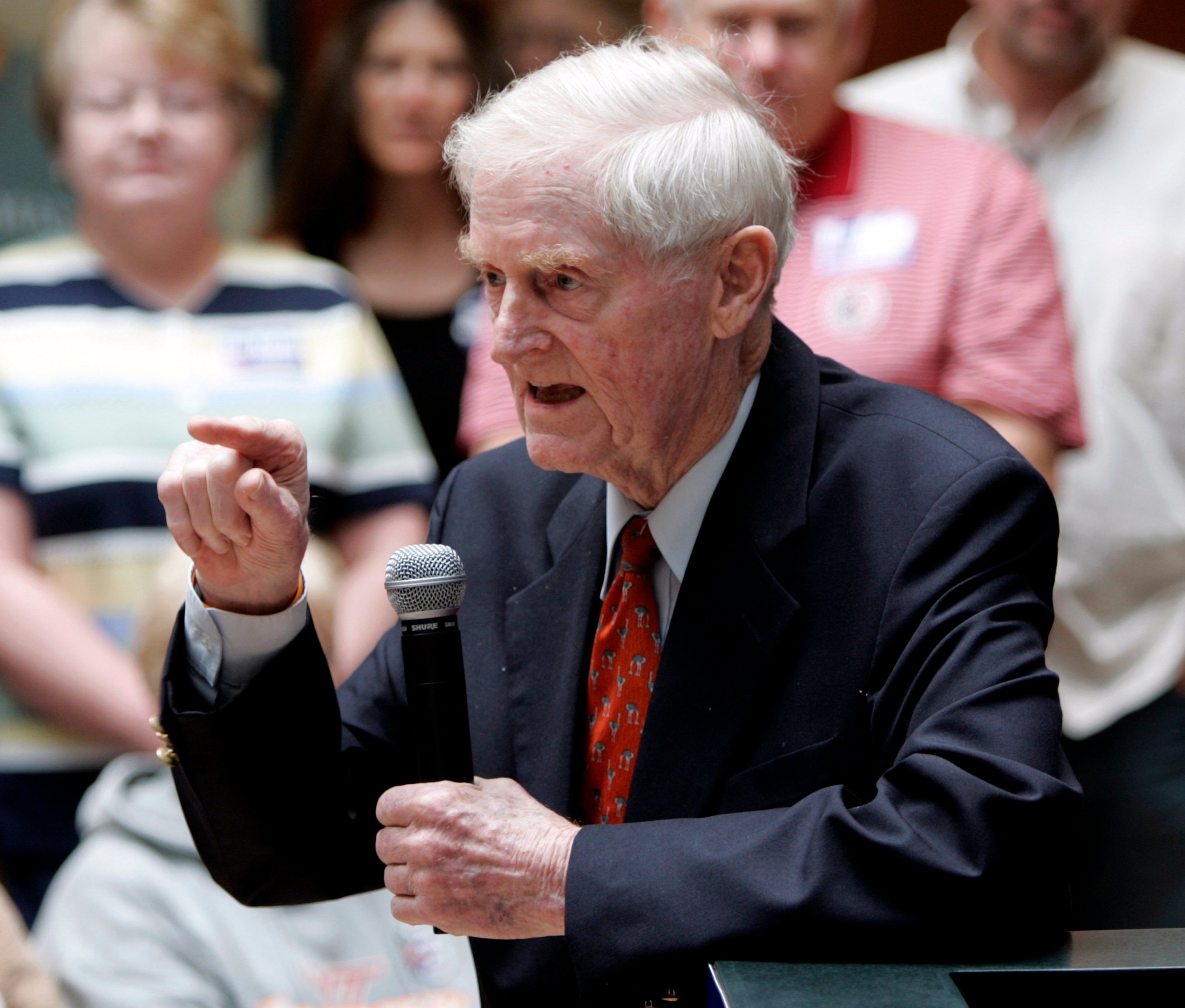Linwood Holton Jr, 1st GOP Va governor of 20th century, dies
A

A. Linwood Holton Jr., Virginia’s first Republican governor since Reconstruction and a crusader against racial discrimination, died Thursday, his family said in a statement. He was 98.
Holton died peacefully Thursday morning at his home in Kilmarnock Virginia, according to the statement from his children that specified no cause of death. The statement was shared by the office of Democratic U.S. Sen. Tim Kaine Holton's son-in-law.
Holton, who served from 1970 to 1974, was a moderate who raised taxes and declared an end to “Massive Resistance,” the state's onetime official policy of opposing public school integration. He eventually fell out of favor with the increasingly conservative GOP, which he criticized as obsessed with cutting taxes at the expense of crucial services.
“I’ll bet not three of 10 people in this room could tell you what tax I increased, but they all appreciate the swimmable rivers throughout Virginia which my 1 percent increase in the state income tax paid for,” Holton said at a 1999 conference surveying his administration.
Holton, who became the state’s first GOP governor since Reconstruction when he defeated Democrat William C. Battle, enrolled his own children in predominantly Black schools rather than fight school busing.
“To the world, Governor Linwood Holton is known as a giant of civil rights and change. When others stood in the doorways of schools to block de-segregation, our Dad walked us (and bused us) to integrated schools to show the rest of the world the way of justice,” his children said in the statement.
Holton also alienated Democrats who controlled the General Assembly when he insisted on a GOP opponent in 1970 for U.S. Sen. Harry F. Byrd Jr.’s bid for reelection as an independent.
By the time his term was over, Holton had lost his party’s support.
Although he never officially left the GOP, the former governor increasingly sided with Democrats.
In 1985, when Democrat L. Douglas Wilder sought to become the state’s first black lieutenant governor, Holton warned Republican gubernatorial candidate Wyatt Durrette that he would openly oppose the GOP ticket if anyone attacked Wilder on racial grounds.
Wilder won and Durrette lost to Democrat Gerald L. Baliles, who in 1988 appointed Holton to head the Center for Innovative Technology, a quasi-governmental agency linking the scientific research of state universities with the needs of private industry.
Holton refused to support Jim Gilmore’s successful campaign for governor in 1997, saying the Republican’s proposal to cut the personal property tax on cars would divert money from public schools. Three years later, he tacitly backed Democratic Sen. Chuck Robb’s failed bid for a third term by criticizing Republican George Allen as too conservative on such issues as abortion rights and gun control.
At the University of Virginia conference on his administration, Holton said the GOP’s attitudes about guns and federal interference in private decision-making were driving voters away. He also called on the party to renounce its “segregationist appeal to Southerners.”
In 2001, Holton actively backed a successful campaign for lieutenant governor by Kaine and later campaigned for Kaine in his successful bid for governor.
Hours after Kaine won the race for governor, Holton underwent surgery for bladder cancer. Holton had known of his ailment for some time but nevertheless campaigned with Kaine in the demanding final days of the campaign, looking pale and drawn at times.
Holton was born Sept. 21, 1923, in Big Stone Gap in southwest Virginia. He went to Washington & Lee University in Lexington, receiving his degree after going into the Navy in World War II. He graduated from the Harvard Law School in 1949.
He set up practice in Roanoke, where he got involved in reviving GOP politics in the region. His first run for public office was in 1965, when he was the GOP nominee for governor against Democrat Mills E. Godwin Jr.
He lost to Godwin, but ironically was succeeded by Godwin, who switched parties during Holton’s term and won in 1973 as a Republican. Virginia is the only state that bars its governor from serving two consecutive terms.
Holton returned to practicing law after leaving office and eventually settled in McLean, a Washington, D.C., suburb.
In 1984, Transportation Secretary Elizabeth Dole appointed Holton to head the commission that turned over Washington National and Dulles International airports from federal to regional control.
Current Democratic Gov. Ralph Northam said Holton “faced down Virginia’s demons and enabled this Commonwealth to look ahead.”
“He showed a wistful state how to embrace the future, inviting us all to be “touched by the better angels of our nature,” in the words of President Lincoln who founded the reforming Republican Party that Linwood Holton revered," Northam said in a statement.
Kaine said in a statement that Holton was “more than a father-in-law — he was my friend and my public service role model.”
“His courageous efforts to end racial discrimination in Virginia, born out of a deep religious conviction about the equality of all God’s children, made him a moral pillar for so many,” Kaine said.
___
Associated Press writer Sarah Rankin contributed to this report from Richmond
Bookmark popover
Removed from bookmarks